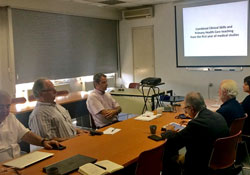Greece initiates development of postgraduate curriculum for family medicine

WHO
Greece is making concrete steps towards the development of a postgraduate curriculum for family medicine. This is a necessary element of the overall reform in primary health care that is currently being rolled out countrywide.
A team of international and local experts, brought together by the WHO Project Office in Athens, visited the country on 4–8 September 2017. Their objective was to review the current framework of family medicine education in Greece and identify feasible options for its continuous and sustainable improvement. The assessment included discussions with key stakeholders and field visits to relevant administrative bodies, educational institutions and health-care providers.
In addition to attending multiple meetings in Athens, the team visited the School of Medicine of Aristotle University of Thessaloniki to learn about the undergraduate education in primary health care. It also visited and the 3rd and 4th regional health authorities of northern Greece to discuss the current collaboration between medical faculties and the health authorities.
The team conducted visits to 2 health centres – one rural and one urban – that are participating in the educational programme of Aristotle University’s School of Medicine. The team witnessed practical training in a primary health-care environment, with the involvement of the previously mentioned organizations.
The development of the postgraduate curriculum will take into account existing good practices in European Union countries, the current educational framework and the Greek population’s needs, as well as the challenges of the transitional period of reforms towards a community-based, integrated health-care system, initiated by the Ministry of Health. All relevant stakeholders will be consulted on the content of the curriculum in further meetings, and it will be continuously adapted until ready for formal approval.
The assessment was carried out under the “Strengthening capacity for universal coverage” (SCUC2) action.
Background
The SCUC action is carried out with funding by the European Union through a grant agreement between the European Commission and WHO/Europe. The general objective of the action is to contribute to improving health and health equity in Greece, especially among the most vulnerable in the crisis-stricken population, by helping the Greek authorities move towards universal coverage and strengthen the effectiveness, efficiency and resilience of their health system.



